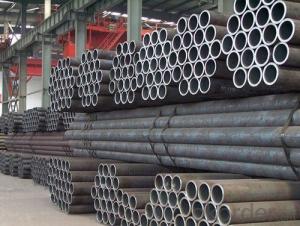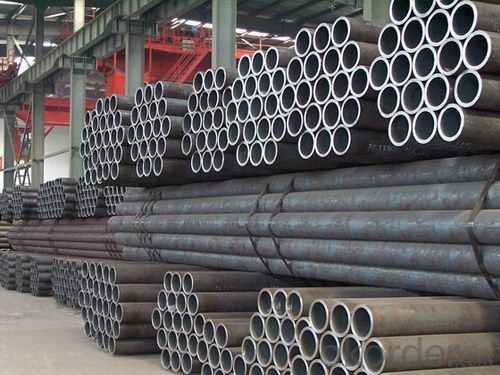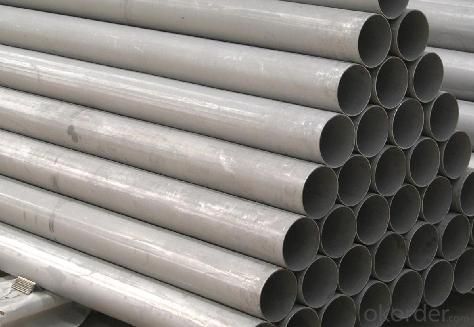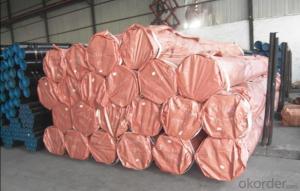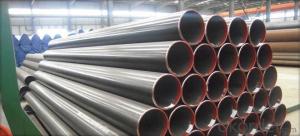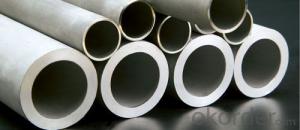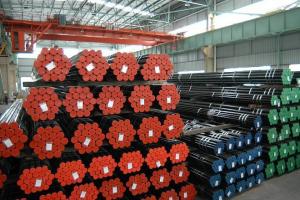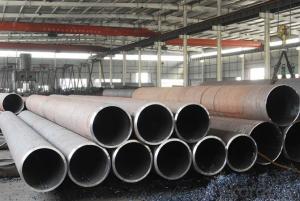API 5L GRAD B Seamless Carbon Steel Pipe
- Loading Port:
- Tianjin
- Payment Terms:
- TT OR LC
- Min Order Qty:
- 25 m.t.
- Supply Capability:
- 10000 m.t./month
OKorder Service Pledge
OKorder Financial Service
You Might Also Like
Product Description:
1、Structure of API 5L GRAD B Seamless Carbon Steel Pipe Description:
Seamless pipe is formed by drawing a solid billet over a piercing rod to create the hollow shell. As the manufacturing process does not include any welding, seamless pipes are perceived to be stronger and more reliable. Historically seamless pipe was regarded as withstanding pressure better than other types, and was often more easily available than welded pipe.
2、Main Features ofAPI 5L GRAD B Seamless Carbon Steel Pipe:
• High manufacturing accuracy
• High strength
• Small inertia resistance
• Strong heat dissipation ability
• Good visual effect
• Reasonable price
3、API 5L GRAD B Seamless Carbon Steel Pipe Images:
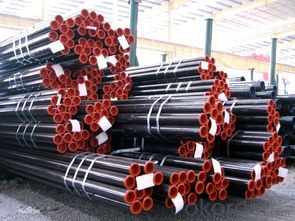
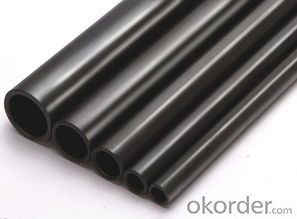
Packaging & Delivery
Packaging Details: | seaworthy package,bundles wrapped with strong steel strip |
Delivery Detail: | 15-30days after received 30%TT |
4、API 5L GRAD B Seamless Carbon Steel Pipe Specification:
Standard | GB, DIN, ASTM |
Grade | 10#-45#, 16Mn |
Thickness | 8 - 33 mm |
Section Shape | Round |
Outer Diameter | 133 - 219 mm |
Place of Origin | Shandong, China (Mainland) |
Secondary Or Not | Non-secondary |
Application | Hydraulic Pipe |
Technique | Cold Drawn |
Certification | API |
Surface Treatment | factory state or painted black |
Special Pipe | API Pipe |
Alloy Or Not | Non-alloy |
Length | 5-12M |
Outer Diameter | 21.3-610mm |
Grade | 20#, 45#, Q345, API J55, API K55, API L80, API N80, API P110, A53B |
Standard | ASME, ASTM |
1.Material:20#(ASTM A 106/A53 GRB.API5LGRB,GB),45#,16Mn,10#.
2.Specification range:OD:21.3-610mm,WT:6-70mm,length:6-12m or according to the requirement of clients.
3.Excutive standards:GB,ASME API5L.ASTM A 106/A53,Despite of the above standards,we can also supply seamless steel pipe with standard of DIN,JIS,and so on,and also develop new products according to the requirements of our clients!
4.Surface:black lacquered,varnish coating or galvanized.
5.Ends:Beveled or square cut,plastic capped,painted.
6.Packing:bundles wrapped with strong steel strip,seaworthy packing.
5、FAQ of API 5L GRAD B Seamless Carbon Steel Pipe:
①How is the quality of your products?
Our products are manufactured strictly according to national and internaional standard, and we take a test
on every pipe before delivered out. If you want see our quality certifications and all kinds of testing report, please just ask us for it.
Guaranteed: If products’ quality don’t accord to discription as we give or the promise before you place order, we promise 100% refund.
②How about price?
Yes, we are factory and be able to give you lowest price below market one, and we have a policy that “ for saving time and absolutely honest business attitude, we quote as lowest as possible for any customer, and discount can be given according to quantity”,if you like bargain and factory price is not low enough as you think, just don’t waste your time.Please trust the quotation we would give you, it is professional one.
③Why should you chose us?
Chose happens because of quality, then price, We can give you both.Additionally, we can also offer professional products inquiry, products knowledge train(for agents), smooth goods delivery, exellent customer solution proposals.Our service formula: good quality+good price+good service=customer’s trust
SGS test is available, customer inspection before shipping is welcome, third party inspection is no problem.
Any question, pls feel free to contact us !
- Q: Can steel pipes be used for airport construction?
- Yes, steel pipes can be utilized in the construction of airports. In the construction industry, steel pipes find widespread application, including in airports. They are often employed for underground utilities like water and sewage lines, as well as for structural purposes such as providing support to the airport terminal building. The utilization of steel pipes for airport construction offers several advantages. Firstly, they possess remarkable strength and durability, making them capable of handling heavy loads and enduring unfavorable weather conditions. This attribute is crucial for ensuring the security and stability of airport structures. Secondly, steel pipes are highly versatile and can be easily tailored to meet specific project requirements. They are available in various sizes and thicknesses, providing flexibility in both design and construction. Moreover, steel pipes can be welded or joined together to form longer sections, which simplifies installation and reduces construction time. Furthermore, steel pipes exhibit resistance to corrosion, a vital characteristic in airports where constant exposure to moisture, salt, and other environmental factors is common. This resistance to corrosion guarantees the longevity and dependability of the infrastructure. Lastly, in comparison to materials like concrete or PVC, steel pipes offer a cost-effective solution. They necessitate relatively low maintenance and boast a long lifespan, thereby minimizing the need for frequent repairs or replacements and ultimately saving time and money in the long term. In conclusion, due to their strength, durability, versatility, corrosion resistance, and cost-effectiveness, steel pipes are a suitable choice for airport construction.
- Q: How are steel pipes tested for mechanical strength?
- Steel pipes are typically tested for mechanical strength through various destructive and non-destructive testing methods. Destructive tests involve subjecting the pipes to tension, compression, or bending forces until failure occurs, allowing the measurement of their ultimate tensile strength, yield strength, and elongation. Non-destructive tests, such as ultrasonic testing, magnetic particle inspection, or radiographic examination, are also conducted to detect any internal or surface defects that may affect the mechanical strength of the pipes. These tests ensure that steel pipes meet the required standards and specifications in terms of their mechanical strength.
- Q: How are steel pipes used in the manufacturing of pressure vessels?
- Steel pipes are commonly used in the manufacturing of pressure vessels due to their high strength and ability to withstand high pressure. These pipes are utilized as the primary material for constructing the shell of the pressure vessel, providing a robust and reliable structure. Additionally, steel pipes offer excellent resistance to corrosion, making them suitable for various industries and applications where pressure vessels are required, such as oil and gas, chemical processing, and power generation.
- Q: Are steel pipes suitable for desalination plants?
- Desalination plants can benefit greatly from the use of steel pipes. These pipes possess a variety of advantages that make them an ideal option for such facilities. Firstly, their resistance to corrosion is of utmost importance in desalination plants, where saltwater can be highly corrosive. The fact that steel pipes can withstand such corrosive conditions ensures the durability and longevity of the infrastructure, ultimately reducing maintenance and replacement expenses. Secondly, steel pipes exhibit remarkable strength, enabling them to withstand high-pressure situations commonly encountered in desalination plants. The ability of steel pipes to handle intense water flow without deformation or leakage guarantees the efficient and dependable operation of the desalination process. Moreover, steel pipes boast excellent heat resistance properties, rendering them suitable for desalination plants that engage in heat-intensive procedures like distillation or reverse osmosis. These pipes can endure high temperatures without suffering any structural damage, ensuring the secure and efficient transfer of heated water or steam. Furthermore, steel pipes are readily available and come in a wide range of sizes and specifications, allowing for flexibility in the design and construction of desalination plants. This availability and versatility make steel pipes a cost-effective choice for desalination projects. Overall, due to their resistance to corrosion, high strength, heat resistance, availability, and cost-effectiveness, steel pipes are highly suitable for desalination plants and are extensively used in the industry.
- Q: What are the different types of pipe fittings used with steel pipes?
- There are several types of pipe fittings commonly used with steel pipes, including elbows, tees, reducers, couplings, unions, flanges, and valves.
- Q: What industries typically use steel pipes?
- Steel pipes are widely used in various industries due to their durability, strength, and versatility. Some of the industries that typically utilize steel pipes include: 1. Construction: Steel pipes are extensively used in the construction industry for various applications such as structural support, plumbing, and underground piping systems. They are commonly used in commercial buildings, residential structures, bridges, and tunnels. 2. Oil and gas: The oil and gas industry heavily relies on steel pipes for drilling, transporting, and distributing oil and gas. Steel pipes are used in offshore drilling rigs, oil refineries, natural gas processing plants, and pipelines to ensure the safe and efficient transport of these valuable resources. 3. Water and wastewater: Steel pipes play a crucial role in providing clean water supply and managing wastewater. They are used in water treatment plants, desalination facilities, and municipal water distribution systems. Steel pipes are also utilized for sewage and stormwater management. 4. Manufacturing: Various manufacturing industries employ steel pipes for specific applications. For instance, automobile manufacturers use steel pipes in exhaust systems, fuel lines, and hydraulic systems. Steel pipes are also used in the manufacturing of machinery, equipment, and appliances. 5. Mining: The mining industry requires strong and durable materials for its operations. Steel pipes are used in mining applications such as conveying materials, ventilation systems, and underground infrastructure. They are particularly useful in transporting minerals, ores, and other mining byproducts. 6. Energy and power: Steel pipes are extensively used in power generation facilities, including thermal power plants, nuclear power plants, and renewable energy installations. They are utilized in steam pipelines, cooling systems, and heat exchangers. Steel pipes are also employed in the construction of transmission lines for electricity distribution. 7. Infrastructure and transportation: Steel pipes are essential for infrastructure development and transportation systems. They are used in the construction of roads, bridges, railways, and airports. Steel pipes are also utilized in the transportation of fluids and gases, such as in pipelines for natural gas or petroleum products. Overall, the versatility and reliability of steel pipes make them indispensable in a wide range of industries, contributing to various aspects of our modern infrastructure and daily lives.
- Q: Can steel pipes be used for high-pressure applications?
- Yes, steel pipes can be used for high-pressure applications. Steel is known for its strength and resilience, making it a suitable material for handling high-pressure fluids or gases. Additionally, steel pipes can withstand extreme temperatures and are resistant to corrosion, further enhancing their suitability for high-pressure applications.
- Q: How are steel pipes manufactured?
- Steel pipes are manufactured through a process called pipe manufacturing or pipe making, which involves various steps such as forming, welding, and finishing. The process starts with the procurement of raw materials, which are typically steel coils or sheets. These coils are then fed through a series of rollers to shape them into a cylindrical form. The edges of the coils are then welded together to create a continuous pipe. After welding, the pipes undergo various finishing processes such as sizing, straightening, and cutting to achieve the desired dimensions and specifications. Finally, the pipes are tested for quality assurance and may undergo additional treatments like galvanization or coating before being ready for use in different industries and applications.
- Q: What is the role of steel pipes in the transportation of chemicals?
- The role of steel pipes in the transportation of chemicals is to provide a strong, durable, and corrosion-resistant conduit for safely moving various types of chemicals from one location to another. Steel pipes are known for their high strength and ability to withstand high pressure, making them suitable for handling hazardous or aggressive substances. Additionally, the smooth interior surface of steel pipes minimizes friction, allowing for efficient and continuous flow of chemicals. The steel material is also resistant to chemical reactions, ensuring the integrity and purity of the transported substances. Overall, steel pipes play a crucial role in ensuring the safe and efficient transportation of chemicals, protecting both the environment and human health.
- Q: How are steel pipes used in the transportation of liquids and gases?
- Steel pipes are used in the transportation of liquids and gases due to their durability, strength, and resistance to corrosion. They are commonly used in industries such as oil and gas, water supply, and chemical processing. Steel pipes ensure the safe and efficient movement of fluids over long distances, as they can withstand high pressure and extreme temperatures. Additionally, their seamless construction minimizes the risk of leaks, making them essential for transporting various liquids and gases.
Send your message to us
API 5L GRAD B Seamless Carbon Steel Pipe
- Loading Port:
- Tianjin
- Payment Terms:
- TT OR LC
- Min Order Qty:
- 25 m.t.
- Supply Capability:
- 10000 m.t./month
OKorder Service Pledge
OKorder Financial Service
Similar products
Hot products
Hot Searches
Related keywords
